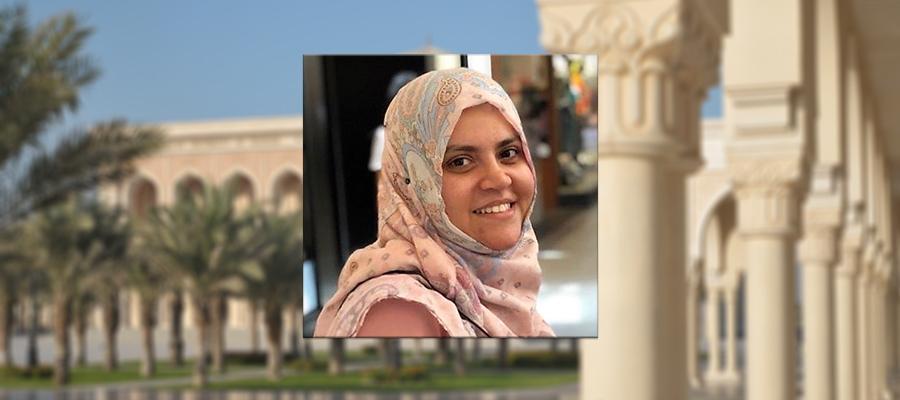- About
- Admissions
- Study at AUS
- Prospective Students
- Bachelor's Degrees
- Master's Degrees
- Doctoral Degrees
- Admission Publications
- International Students
- Contact Admissions
- Grants and Scholarships
- Sponsorship Liaison Services
- Testing Center
- New Student Guide
- File Completion
- New Student Orientation
- Payment Guide
- Executive Education
- Students with Disabilities
- Academics
- Life at AUS
- Research
- Contact Us
- Apply Now
- .

Creating one’s own distinct path with a liberal arts education
Persistence and hard work have been the cornerstones of the life of American University of Sharjah (AUS) alumna Abiya Ahmed, who graduated with a bachelor’s degree in mass communication in 2006.
All set to defend her PhD thesis in Education at Stanford University this April, Ahmed currently works as the Associate Dean of Students and Director of the Markaz Resource Center at Stanford. The Markaz is one of seven centers for equity, community and leadership housed in Stanford Student Affairs. Her work involves, among other things, leading the center's professional and student staff, curating the center’s programs and campus collaborations, and designing strategic goals for the center.
“My career trajectory has been kind of unconventional, but I've always been connected to writing, research and education in some form or another,” said Ahmed.
While she began her career in journalism and media relations in the UAE and the US, she later switched career tracks to become a middle school teacher and program developer. Ahmed then received a Master of Arts in Islamic Studies from the University of Aberdeen, UK, following that up with another master’s degree in religious studies from Stanford University.
“I feel that the highlights of my career thus far would be my publications: journal articles, a book chapter and op-eds I’ve written for local newspapers. And now, being in a position to direct a center that allows me to be a scholar-practitioner and having the opportunity to teach a course on and off— such work gives me immense satisfaction,” she said.
Her doctoral dissertation focuses on the intersection of religion and higher education, while engaging with religious studies, sociology, anthropology and critical theory, among other fields. “My research is interdisciplinary because I think people's lived experiences don't always map onto segregated academic fields. Therefore, I believe it is important to use multiple lenses to understand a given human condition or phenomenon,” she explained.
For Ahmed, her AUS education laid the foundations for her work today. “So much of what I learned at AUS and who I learned it with has led me to where I am today. Of course, my mass communication degree has been invaluable in pursuing graduate education because writing is so central to this work. I am particularly grateful to Dr. Joseph Gibbs, who was my primary undergraduate advisor at AUS and who taught me how to write effectively and who, from the beginning, has always pushed me to pursue a PhD,” said Ahmed.
The liberal arts approach followed by AUS, which allows students to take courses for many disciplines outside their major field of study, has also shaped Ahmed’s way of thinking.
She said: “The other thing about AUS that really impacted me was all the electives I took in multiple fields, from cultural studies to Islamic studies, economics and philosophy, to name a few. That really shaped my thinking about the power of interdisciplinary paradigms. Finally, I attended AUS when it was still in its nascent stages, and I really enjoyed the small class sizes and the close student-faculty relationships. So much of learning happens outside the classroom, and the AUS experience I had certainly reflected that.”
Her persistence and hard work are credited for where she is today. She explained: “The first time I applied to Stanford, I was rejected. It was terribly disheartening and demotivating, but I applied again the following year—and here I am!”
It is with persistence and hard work that she intends to face other challenges, namely creating her own path. “The challenge I constantly face is creating the path I want to tread as opposed to walking one already created. Still, I find the prospect exciting and I've been blessed to be surrounded by mentors and colleagues who make it possible for me. I also wouldn’t be here without my husband, who consistently motivates me; my parents, who have always backed me; and my son, who inspires me. There's no substitute for that kind of support system, and I certainly don't take it for granted,” she said.

